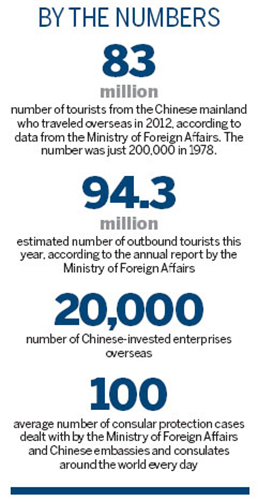 |
|
A worker is flown home to China for treatment after being injured in an explosion in the Republic of the Congo. The man was one of 31 Chinese workers injured the accident. Wang Minjie / Xinhua |
Recent incidents a cause for concern, report He Na in Beijing, Li Xiang in Paris and Chen Jia in San Francisco.
A series of incidents involving Chinese citizens overseas has shocked the country and prompted public concern about the safety of Chinese people when traveling abroad.
Six students from the nation were attacked at a house in Hostens, southwestern France, on the night of June 15 by three local men who had been drinking. One of the students was hit in the face with a bottle, leaving her with injuries that required hospital treatment.
Two Chinese nationals and a Chinese-American were among nine foreign climbers killed by gunmen at a base camp near Nanga Parbat, one of the world's highest mountains, in Pakistan's northern territory of Gilgit on June 23.
Two days later, four Chinese were murdered in a knife attack at a bakery in Port Moresby, the capital of Papua New Guinea. The victims, three men and a woman, were hacked and stabbed repeatedly by masked assailants. One of the victims is believed to have been decapitated and the others dismembered.
Given the circumstances - the attack in Gilgit was the first of its kind in the region, while Port Moresby has a justified reputation as a dangerous place - it's open to debate whether ethnicity played a role in the incidents or if the victims were simply in the wrong place at the wrong time. However, the wave of attacks has led to a growing perception that Chinese nationals aren't safe overseas.
The continuing rise in living standards means millions of Chinese travel overseas every year, for business, investment, work, tourism and study. Others leave for good via emigration programs. At the same time, the number of violent incidents involving Chinese nationals overseas has also increased.
A narrow escape
Teng Fei, a project manager at a large IT enterprise, has just finished a six-and-a-half year stint working in Pakistan and Afghanistan. He said the experience of living and working in those two volatile countries has sharpened his appreciation of "safety".
"People who live in peaceful places simply don't have a sense of war, but during my stay in Afghanistan, I was constantly aware that the conflict was so close," said the 33-year-old, who now works in the Netherlands.
Teng recalled being just a block away from the scene of a violent attack. Three masked insurgents attacked a polling station during a presidential election and exchanged gunfire with US soldiers. "We could hear the gunshots clearly. Cold sweat ran from my forehead. I was terrified," he said.

In addition to the daily threat to life and limb, Teng and his colleagues often fell victim to fraud and robbery.
"Colleagues often said they had been cheated by bogus policeman. They stop you in the street and ask to check your passport as an opportunity to grab your wallet," he said.
One of Teng's colleagues had a brush with death when a thief who had snatched his bag thought the man was about to fight back.
"The move incensed the thief, who pulled a gun and opened fire. Luckily, the bullet hit a laptop computer my colleague was carrying and apart from a large hole burned in his clothes, he was uninjured," Teng said.
Although he had a narrow escape, Teng's colleague was so severely traumatized that he remains too frightened to leave home alone after dark, even in China.
Dianne Yan, a Chinese student at the Academy of Art University in San Francisco, said she tries to avoid traveling alone after 11 pm and always keeps between $40 and $60 in her purse as a survival strategy in the event of robbery or attack. Her parents and many older Chinese immigrants advised Yan to give the money to the assailant and say, "I didn't see your face. Just take what you want and go away please."
Changing times
Data from the Ministry of Foreign Affairs show that more than 83 million residents of the Chinese mainland traveled overseas in 2012, a massive increase from the 200,000 that went abroad in 1978.
The ministry's annual report on China's development of outbound tourism shows the number of outbound tourists is expected to reach 94.3 million this year.
Moreover, there are more than 20,000 Chinese-invested enterprises overseas.
On average, the ministry and Chinese embassies and consulates around the world deal with about 100 consular protection cases every day.
Xia Xueluan, a sociology professor at Peking University, said that in the 1980s very few Chinese had the opportunity to travel overseas and most who did were selected representatives of various industries.
However, times have changed. "Nowadays, as long as you have money, you can go abroad. But examples of poor behavior by some Chinese tourists, such as speaking loudly, queue jumping or vandalizing historic relics, often raise eyebrows among the locals," he said. Indeed, a 15-year-old Chinese tourist was recently forced to issue an apology after defacing the 3,500-year-old Luxor Temple in Egypt by carving his name into the stone.
This sort of unpleasant behavior not only tarnishes the image of China overseas, but can also spark conflict with annoyed locals.
Although Xia believes that most of the incidents are isolated cases, he pointed out that Chinese tourists often leave themselves open to attack; for example, it's well known that many Chinese refuse to use credit or debit cards overseas. As a result, they carry large amounts of cash on their person, making them easy targets for thieves.
Moreover, Xia said some of the attacks are a result of the current international situation.
|
|
|
|
|
|
|
|
